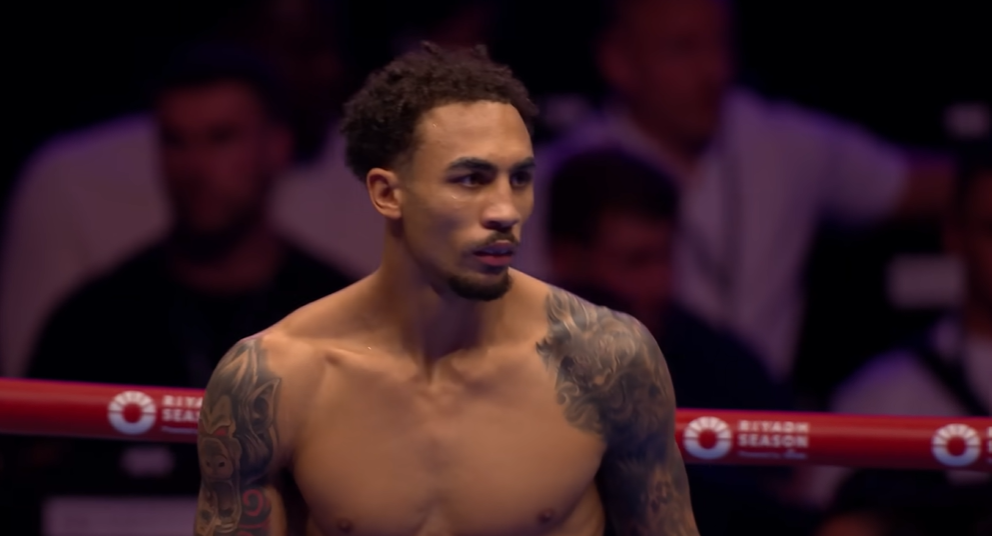Ben Whittaker is a master of showmanship, bold and relentless in both style and substance, and he has built his career on sharp angles. But behind the social media soundbites and knockout reels is a remarkably measured life. He has done the exact opposite of what many had anticipated, which was to emphasize his personal life in the same manner that he does his entrances. A little-known fact that underpins the entire story is tucked away in his Facebook profile: he is married to Laura Dewit, whose name is frequently mentioned but has a significant role in his tale.
Talk about Whittaker has mostly focused on his eagerly awaited rematch with Liam Cameron in recent weeks. But behind his sharpened focus and noticeably better attitude is the kind of consistent influence that rarely makes news. It seems especially helpful to have a deeply personal anchor like Laura for someone who acknowledges that acting out a role can be exhausting, both for emotional equilibrium and for identity clarity.
Ben Whittaker | Verified Bio and Career Table
| Attribute | Details |
|---|---|
| Full Name | Benjamin G. Whittaker |
| Date of Birth | June 6, 1997 |
| Age | 27 years old |
| Birthplace | Darlaston, West Midlands, England |
| Nationality | British |
| Profession | Professional Boxer |
| Marital Status | Married |
| Spouse | Laura Dewit |
| Residence | Avalon, New South Wales, Australia |
| Olympic Medal | Silver, Tokyo 2020 (Light-heavyweight) |
| Pro Record | 9 Fights, 8 Wins, 0 Losses, 1 Technical Draw (as of April 2025) |
| Trainer (2025) | Andy Lee |
| Source | Mirror – Apr 2025 |
Whittaker’s strategic changes, such as moving his training to Dublin and working with former world champion Andy Lee, are in line with a more reflective phase of his career. This move has allowed him to distance himself from the weariness of his media-driven persona while simultaneously honing the fundamentals. He is reverting to what he refers to as “the old Ben” by doing this, a version that depends more on strategic execution than on flash. In his interviews, where his tone is softer and his responses more grounded, that change is particularly noticeable.

His rebaptism earlier this year, which was brought on by spending time at church with his mother, is indicative of a more comprehensive reset. He characterized the experience as grounding and emotional, highlighting the ways in which faith has assisted him in readjusting. Whittaker is deliberately bringing rhythm and tranquility into a life that is frequently disturbed by noise by participating in online services even while in training camp. This decision not only suggests a spiritual commitment, but it also shows a very effective coping strategy in a sport that seldom takes time to think.
The influence of Laura Dewit is central to this story arc, even though it isn’t explicitly stated. She keeps herself out of the spotlight so Whittaker’s development can proceed unhindered. It is not silence that keeps her out of the media cycle; rather, it is a strategy. In a digital world where intimacy and exposure are frequently confused, their relationship serves as a surprisingly inexpensive reminder that privacy is still important. The goal is to preserve, not to hide.
Whittaker has admitted to the pressures of performing both inside and outside of the ring. Even though the flamboyant persona is entertaining, it requires ongoing maintenance. “It’s exhausting,” he acknowledged. “You have to travel around doing media. Time and effort are required. A rare weakness is revealed by that kind of admission, especially from an athlete whose reputation depends on being “on” at all times. From this vantage point, Laura’s grounded presence becomes strategically stabilizing as well as consoling.
This dynamic reverberates throughout boxing. Whittaker takes a different tack than Tyson Fury and Anthony Joshua, whose names have often blended personal and professional histories. His decision to let his boxing speak for itself is highlighted by his silence on marriage rather than a sign of distance. He provides a new type of role model—one who entertains without oversharing—by contrasting his private foundation with his public flash.
Whittaker shows no signs of being intimidated by criticism as his fight with Liam Cameron draws near. Following the chaotic conclusion of their first fight, in which both fighters crashed out of the ring and the bout was declared a technical draw, Whittaker was subjected to industry speculation and online mockery. He decided to redirect rather than fight fire with fire. In addition to being a contender going into this rematch, he has considerably lessened the emotional baggage that previously hung over his performance thanks to strategic training and spiritual realignment.
For individuals who have followed his ascent from Olympic silver to professional contender, this change resembles a reboot. His personality should be integrated with a purpose rather than abandoned. He still flaunts his talents, but they are now combined with a more profound comprehension of his true self. He stated, “That will always be there” in reference to his style. Andy Lee enjoys it, but others will despise it. It’s distinct.
Whittaker may be able to exist in two different lane as an entertainer and an introspective athlete because of his uniqueness. He creates a space for something incredibly resilient—trust, clarity, and a long-lasting foundation—by keeping his relationship off-stage.


